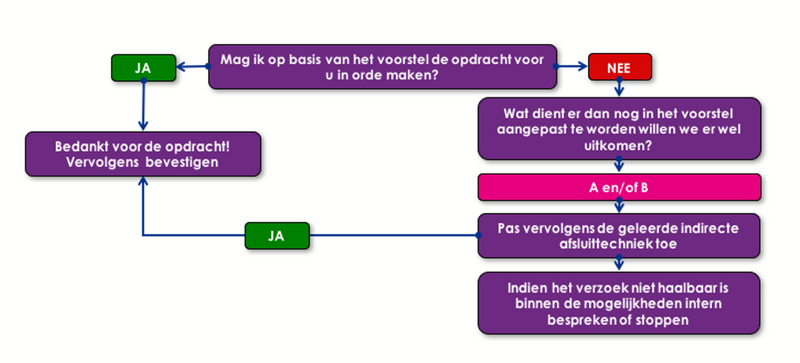Follow-up of Quotations Successful


Last update on: 1 Sept 2025
Reviewed by: ![]() Aynsley Romeinsen
Aynsley Romeinsen
If you've been able to send a quotation to a potential customer, you've taken an important step in the right direction. Unfortunately, you haven't secured the order yet. It's highly likely that your potential customer has requested quotes from multiple companies. That's why following up on a quotation is crucial. But how do you do it most successfully? Is it best to send an email or make a phone call? And what exactly should you communicate during such a conversation or in such an email? We'll guide you with follow-up quotation examples.
Contents:

Following up on a quotation can be quite challenging. Not only is it essential for your company's revenue, but also, no one likes to receive a rejection. Although this rejection is not personal, as it involves a business deal, it can sometimes feel that way. This may make you apprehensive about following up on a quotation. However, it's crucial that you take action to ensure you don't miss opportunities and secure as many deals as possible. The following tips will make following up on quotations easier and more effective.
Creating a quotation requires a significant time investment. The least you can expect from a prospect or customer is a scheduled contact moment for the follow-up of the proposal. Such a follow-up appointment can be physical, online, or over the phone. Strike while the iron is hot, as the saying goes. Make this follow-up appointment when you're in a discussion and agree to create a quotation. The advantage of a follow-up appointment is that the client is then aware that a decision needs to be made. Agree on a realistic timeframe for both parties. This way, you maintain better control over the sales cycle.
Every customer is different, so there isn't one approach that works for every quotation. Therefore, when following up on a quotation, it's important to personalize the approach. Pay close attention to the customer's preferences. If the customer prefers email communication, it's probably counterproductive to make a phone call. For other customers, phone contact may work excellently. Or perhaps the customer would like a face-to-face meeting with you to close the deal. Always tailor your approach to the customer's preferences. By being flexible, you increase your likability, making the customer more inclined to collaborate with you.
Following up on a quotation can be quite nerve-wracking. This tension may unconsciously affect the follow-up of the quotation. Therefore, it's important to work on your own mindset. Try to create a positive image of the follow-up for yourself. Assume the most positive scenario. This will positively influence your mindset, allowing you to carry out the follow-up with more confidence. Always keep in mind that it's a business deal. If the conversation doesn't have the outcome you want, it's not a personal rejection. Also, realize that a prospect or customer often initially responds with a "no" when you ask for the order. This is often because they still want to negotiate certain terms. Know how to respond to this "no" and see it as a "not yet." Always ask the question, "What needs to change to get the order?" This way, with a positive mindset, the other person can indicate how they want to proceed. Then, you can discuss or negotiate these terms together.
During the follow-up of a quotation, you primarily want to know if the customer has made a decision. However, it's important not to focus too much on this point immediately. Of course, first ask how they are doing. Personal attention is always good for the atmosphere. Once this is done, get straight "to the point." Ask if you can convert the proposal into an order confirmation. Or ask, "Can we start working together based on the proposal?" The other person will now need to respond immediately with a story about why or why not. With a positive answer, you can thank them for the order. In case of a "no," stay positive and ask future-oriented questions. For example: "What needs to be changed in the proposal for us to do business together?"
With the above tips, following up on a quotation becomes much easier. To further assist you, here's an example of a follow-up quotation for you. Use this example as inspiration for your own follow-up of quotations.

The above scenario is an example of following up on a quotation. Especially when you're going to make a follow-up call, it's wise to prepare for the conversation. Write out the text for different situations before the follow-up, so you always know how to respond best. This way, you won't be caught off guard.
When writing a follow-up email, it's wise to put yourself in the customer's shoes. Were there points in previous discussions where the customer clearly had doubts? Proactively address these points. Specifically, ask if the quotation was clear on those points. This makes the customer feel heard, increasing the chances of a 'yes.'

Sending a quotation reminder can be done via email, but it can also be done over the phone. Following up on a quotation via phone is usually more effective. During a phone conversation, you can address any questions or doubts the customer may have directly. Additionally, an email is much easier to ignore. However, by scheduling a follow-up appointment to follow up and discuss the proposal, you retain the most control over the sales cycle.
Nevertheless, there may be situations where a quotation reminder via email is the better choice. Perhaps you can't reach the potential customer by phone, or maybe the customer has already indicated a preference for email contact. In such a case, it's better to send an email so that the customer feels that you are listening to their preferences. In your email, you can always suggest a phone call or a personal meeting to answer any questions the customer may have. Try to make the follow-up as personal as possible and be flexible with the customer. This will undoubtedly be appreciated.
Following up on a quotation can be extremely nerve-wracking, but it is also undoubtedly crucial. Therefore, it's wise to dedicate sufficient attention to this part of your sales strategy. Assess each situation to determine the best approach for the follow-up. Cater to the preferences of your customer and remain open to questions.
If following up on quotations is currently challenging for you, consider seeking help from our experts. They are more than willing to assist you, so you can increasingly succeed in effectively following up on quotations.